Peter MALONE
Saturday, 09 October 2021 12:59
Unexpected Love, An/ Un Amor Menos Pensados
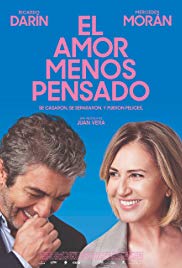
AN UNEXPECTED LOVE/ EL AMOR MENOS PENSADOS
Argentina, 2018, 129 minutes, Colour.
Ricardo Darin, Mercedes Moran.
Directed by Juan Vera.
A drama of interest and appeal to older audiences, audiences who will identify with the two central characters, Marcos and Ana, played by two of Argentina’s premier actors, Ricardo Darin and Mercedes Moran.
Marcos and Ana have been married for 25 years and their only son is about to set off for overseas studies in Spain. The point is immediately made as to how the parents will cope, the “empty nest� syndrome (which they immediately deny), the question of how to handle a new phase of life without the attention and love given to the child (which, of course, can continue in an age of email, texting and Skype).
Marcos is a rather literary man, a philosopher, who can live happily in his head and with his books. Ana has her own interests, working in support groups for women. But, the question for them and for the audience, what is the meaning of their lives up till now and can it continue in the same vein as well as the question of their love for each other, sustained in the past, facing new demands and tests, facing new opportunities, possibilities for change and development.
Of course, the title has given away the plot – or at least tantalise the audience to want to watch what unexpected love is like and how it is lived out and what are the consequences.
The time pace of the film starts with days, moves to weeks, to months and even to years of how Marcos and Ana are coping. There is a mutual agreement on freedom, and initial letting down of hair, some rather raucous clubbing, affairs, setting up new accommodation, friendship but a day by day, month by month, even years by years, story of separate lives.
The filmmakers seem to presume that we are interested to see what happens in this post empty nest period of Marcos and Ana’s lives, whether they cope or not, what are the differences in their behaviour, and their work, in their personalities, in their relationships. And, there are a lot of relationships, built on what…? Needs? Love and affection? Or just companionship? Or just avoidance of being alone? How deep and how shallow are these unexpected loves?
And what if, Marcos and Ana ask each other, the unexpected loves are superficial and not nearly as deep as the love and companionship of the original love? Which is also a question that challenges the audience. Falling out of love? Unexpected loves? And need for emotional and psychological help? An appreciation of the initial and long-lasting love?
An Argentinian setting, but universal questions and themes.
1. Argentinian story? Universal themes?
2. The cast, their status in Argentina?
3. The settings, the Argentinian city? Homes, workplaces, apartments, clubs, activities? The musical score?
4. The “empty nest� syndrome, the effect on each parent?
5. The use of love, love taken for granted, the son and his being the focus, leaving for overseas studies, the result?
6. The routine conversations, life at home, discussions about their love, their past, real love? The decision to separate?
7. Ownership of the house, each partner with their own possessions? The decision to sell, changing, letting go of possessions?
8. The experience of freedom, freedom from each other, in weeks, in months, in years?
9. The nature of the freedom, casual relationships, longer relationships, experimentation, sexual freedom? Marcos and his life, the types of women, their idiosyncrasies? His work? Living together with the women, tensions? Anna, literally letting her hair down, her transformation, the range of men, the relationships, the breakups?
10. The sun, keeping in contact with each parent, over the years?
11. The year is passing, the experiences of each, running into each other, yet feeling unfulfilled?
12. Derangement of the final meeting, talking, comfortable with each other, laughing, memories, the sharing, the past bonds, the possibilities for the future?
13. A second unexpected love?
Published in Movie Reviews
Published in
Movie Reviews
Saturday, 09 October 2021 12:59
Loving Pablo
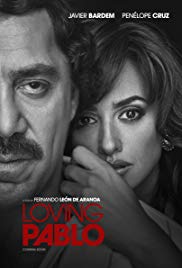
LOVING PABLO
Spain, 2018, 123 minutes, Colour.
Javier Bardem, Penelope Cruz, Peter Sarsgaard.
Directed by Fernando Leon de Aranoa.
This is a version of the career of Pablo Escobar, the notorious drug dealer from Colombia, indicating his rise from poverty to wealth, his setting up of drug dealing, infiltrating the United States with cocaine in the 1980s and 1990s.
There have been several films about Escobar and a television series, Narcs.
This film is based on a biography by a Colombian television celebrity, Virginia Vallejo, played by Penelope Cruz, who became Escobar’s mistress, enjoying his success, but eventually falling out with him, fearful, threatened, speaking to representatives of the DEA and, publishing her story because Escobar had told her to tell it – but not to whom!
Escobar himself is played by Javier Bardem (who, in real life, is married to Penelope Cruz). The actor is a big man and fills himself out to play the literally larger than life drug lord. He remembers his rise from poverty, and building up his empire with a range of thugs, international deals. And, he engineers his entry into the Colombian parliament – and assassinating politicians who denounced him.
Ultimately, he is imprisoned, living a rather luxurious life, but then confined, attempting to escape, pursued and killed.
There is very little sympathy for Escobar in the way that he is portrayed in this film, his love for his family, his womanising, his ruthless exploitation to promote his empire.
1. Audience interest in Pablo Escobar? Knowledge about him, Colombia, the drug trade, his criminal activities, cocaine infiltrated into the US? As a character in himself, dramatised here, the attitude of the Colombians? Of the Americans?
2. The settings, Colombia in the 1980s and 1990s, the landscapes, the mountains, the crops, the wealthy hacienda, the city of Medellin? Bogota? The parliament, the streets and assassinations? Meals and gatherings? Meetings in Panama? The musical score?
3. The American sequences, highways used as airports, Miami, airports? The DEA?
4. The film as based on the biography by Virginia? The opening, on the plane, with Shepherd, the discussions? The end of the film, her being rescued, her saying Pablo’s biography was to be told by her – but to whom?
5. Virginia in herself, Penelope Cruz, television star, glamour and celebrity, ambitious, the impact of the party, meeting Escobar, fascinated by him? His wife, Virginia as mistress? The money and the glamour, clothes and fashion? Prestige? Her knowledge of what was going on, putting it aside, but the impact of the murders, his giving her the gun? Her being wary, the separation, her being in danger, Escobar confronting her and calling her a bitch? The contact with Shepherd, the meetings and discussions, the interviews? Her fear, going to pawn the jewellery, the gun attack? Getting more information about him, the news about him, going to visit him in prison, concerned for her safety?
6. Escobar, Javier Bardem, the big man, lower class, his enterprise, the crops for the drugs, building up an empire, his henchmen, their violence? The money, the Hacienda, the people visiting, the glamour, the swimming pool? His relationship with his wife, his son, her pregnancy, the daughter? His continued betrayals, her continued fidelity? Growing power, wealth, reputation? Attitude of the American government?
7. Escobar and the money, corruption, power, campaigning to get into the parliament, his success, the speeches, his being denounced, organising the assassination?
8. Getting the drugs to the United States, the links, the plane landing on the freeway, the unloading of the drugs on the tarmac?
9. Going to Panama, his men, the discussions, financial issues? Issues of extradition to the US?
10. Shepherd, the DEA, the television interview with Reagan, Nancy Reagan and drugs? The issues of extradition?
11. The assassinations, the continued and increased violence, against the government and judiciary?
12. The pursuit of Escobar, catching him, putting him in prison but his living in luxury, the visits, his family, Virginia and his attack on her? The episode of wanting to get his daughter the ice cream, but his not being allowed out?
13. The increasing violence in the streets, his associates, his being taken to a more enclosed prison? The wire, electrified, the switch in his room, his escape?
14. The strategies, the drugs in Colombia, going to the United States? Shepherd and the agencies?
15. The family going to Germany, the being stopped, Shepherd’s intervention, the return to Colombia? Kept in the hotel?
16. The family used as bait, Escobar phoning them, the continued tracking, the surrounding of the building? The confrontation, his getting out the window, the shootout?
17. Virginia, safety, the biography?
18. A dramatisation of criminal activity in the 20th century?
Published in Movie Reviews
Published in
Movie Reviews
Saturday, 09 October 2021 12:59
Into the Forest
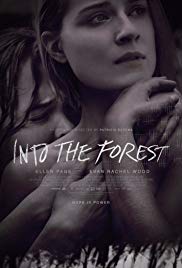
INTO THE FOREST
Canada, 2018, 94 minutes, Colour.
Ellen Page, Evan Rachel Ward, Callum Keith Rennie, Wendy Crewson, Max Minghella, Michael Eklund.
Directed by Patricia Roszema.
Into the forest is, one might say, a very quiet apocalyptic story. It is written in such a way that audiences realised that it could happen at any moment.
The initial focus is on a father and his two daughters living in the Canadian countryside. He is a widower. One of the daughters is preparing for a ballet audition, the other is studying. The ballet dancer is played by Evan Rachel Ward and the student by Ellen page. Callum Keith Rennie is the father.
Suddenly, the power goes out – and stays out for weeks, months, and eventually all the time. While there is initially some television news, contact with the outside world fades. There are rumours of restoration in the United States but these are rumours.
While initially, father and daughters went into the town, there is no petrol so they cannot make return visits. There is a visit from one young man who persuades the student daughter to leave with him to find somewhere where life is normal, but, she decides to go home to be with her sister with whom she clashes after the accidental death of their father.
Later, another man arrives, a plausible story, but actually rapes the ballerina.
As time goes on, the health becomes more dilapidated, there is very little in the house to sustain them, especially when the ballerina is pregnant.
The title indicates the decision that the two sisters make to survive – to go into the forest.
Direction is by Patricia Rozema who made a number of significant Canadian films, I’ve Heard the Mermaids Singing, When Night is Falling and a version of Mansfield Park.
This is not an action packed super-hero style post-apocalyptic story – as has been said, this scenario could happen today or tomorrow..
1. An apocalyptic story, but in a familiar 21st-century world, audiences identifying with the characters, the situation, imagining how they would cope in similar circumstances?
2. An imaginable apocalypse, the loss of electricity, power, loss of communications, falling back on limited resources, isolation but improvisation, the consequences of the lack of power and technology? Humans coping in “more primitive� conditions?
3. The Canadian settings, the forest, the town, the home and buildings, the interiors, the grounds, the farm? The musical score?
4. The family unit, the father and his character, love for his daughter, the dead mother, memories, the home videos? The family bonds? Their way of life, memories of the mother, Eva and her age, dancing practice, intensity, wanting the audition? Ellie, her age, studies? Their hopes, hopes being dashed, the reactions?
5. The small amount of gas, going to town, buying provisions, the man at the store and his helping? The party with the young people? Going home, isolated?
6. The day is turning into months? No communications, the spreading rumours, unable to move out from the home, the growing isolation?
7. The father, the accident, digging the grave and burying him? Ellie and her continued work with her books, finding the references, the descriptions of flowers and plants? Ellie and her continuing to dance, no music, the metric home metronome, her becoming more obsessed? Each self-focused? Get the love for each other?
8. The young man from the town, memories of the past, his arrival, Ellie and the sexual encounter, Eva and her talk about unwanted pregnancies? His persuading Ellie to leave, the packing, going into the forest, Ellie and the decision to return?
9. The man’s sudden arrival, the threats, raping Eva, her reaction, horror, Ellie’s care, finally accepting her pregnancy?
10. The interactions between the sisters, issues of food and cooking, the discovery of the chocolate, the decision not to use the gas, Eva upset, Ellie’s relenting, the amount of music, dance? The pregnancy, Eva and her hopes, no abortion? The birth of the baby? The devotion?
11. The house collapsing, Eva thinking the atmosphere toxic, the decision to burn the house and use the remaining gas?
12. Into the forest, into the future?
Published in Movie Reviews
Published in
Movie Reviews
Saturday, 09 October 2021 12:59
Diego Maradona
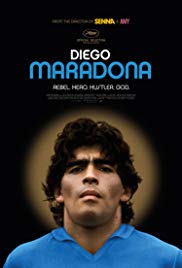
DIEGO MARADONA
UK, 2019, 129 minutes, Colour.
Directed by Asif Kapidia.
Probably best to describe this film as a profile of the world champion football player from Argentina, Diego Maradona. While it is something of a portrait, most viewers of the film would be interested in having a lot more information and background. There is very little about his origins, lower class, some interviews with his mother, something about his childhood sweetheart, his relationship with women, his marriage, children.
The film-makers make the point by including a stroke in the title, Diego/Maradona, indicating that each part of his name does not adequately describe the whole person – or that there seem to be two differing personalities, Diego and Maradona.
The reason for using the word ‘profile’ arises because so much of the film is film footage, television interviews, interviews with talking heads. Maradona is mainly seen as being interviewed, or described.
And, as for interest, it will depend on audiences love for football/soccer, their knowledge of world competitions at the end of the 20th century and whether they know of the tangles in Maradona’s life and career. For those not interested, this profile will not necessarily engage them.
Whether one is a football fan or not, the footage of Maradona in play is quite outstanding. Or, rather, Maradona’s skills, his sense of timing, the movement and agility of his feet, his leaping, his misleading his opponents, these are highlighted and certainly cause audience admiration.
While Maradona was Argentinian, his career took him to Europe, initially to Barcelona which was not a successful move, and then to Naples. The Neapolitans embraced him, and he responded with moving their team further and further up the ladder to championship.
Audience interest may well be aroused by what happened to Maradona in Naples – there are some explanations, some talking heads giving information or speculating about what happened. And, what happened is Maradona’s celebrity life, introduction to drugs, the connection with the Neapolitan Mafia, a spectacular fall from grace. This profile does not really explore Maradona and his motivations and behaviour. They are taken as fact, the response of the authorities, the court appearances in courts, his penalties.
There is some final footage of Maradona in 2016, not looking like the agile football player that he was, rather, a man of increasing weight, age, some moments of contemplating what he was and what he might have been.
The British director, Asif Kapidia, made two previous documentaries on more widely known celebrities and their lives and careers, racing driver Ayrton Senna and singer, Amy Winehouse.
Published in Movie Reviews
Published in
Movie Reviews
Saturday, 09 October 2021 12:59
Fosse/ Verdon
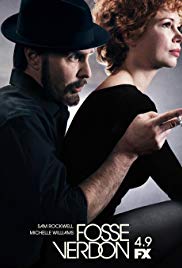
FOSSE/VERDON
US, 2019, 350 minutes, Colour.
Sam Rockwell, Michelle Williams, Norman Leo Butz, Aya Cash, Nate Corddry, Kelly Barrett, Paul Reiser, Juliet Brett, Blake Baumgartner.
Directed by Thomas Kail.
This television series about the lives and careers of cancer/choreographer/director, Bob Fosse, and his partner, dancer, Gwen burden, won many awards nominations, especially for its stars, an extraordinary performance by Sam Rockwell (Oscar for Three Billboards…) Immersing himself in the character of Bob Fosse and for Michelle Williams, who can take on a great variety of roles, showing her musical talent in The Greatest Showman.
The scope of the series is to focus on Fosse’s creative years but also to go back into his past, flashbacks about his childhood, difficult family, his dancing talent, employment and’s exhilaration, is introduction to sexuality by the the strippers and dances in burlesque. It moves over his period as dancer in the MGM musicals and other films of the period. The film also has flashbacks to Gwen burden’s early life, married young, a son whom she gave up, early attempts at a career.
The film moves backwards and forwards in time but the linear development is of the meeting between Bob Fosse and Gwen burden for Damn Yankees and its success, they collaboration on Sweet Charity, the film opening with the choreographing of A Big Spender (reprised at the end in rehearsals for revival, Fosse dying of a heart attack in the street on his way to the opening).
One of the coproducers of the film was their daughter, Nicole Fosse, who abuses a character throughout the series, is a young girl with star parents, onset, backstage, growing up, a touch precocious – and following through her teenage years, her ballet classes, her being lonely when present at adult parties, her experimentation with alcohol and drugs. The film indicates that her mother retired to live with her but died only a few months later. Nicole Fosse went into rehabilitation.
Those who noble Fosse’s career, the film is interesting in its overview of his contribution to damn Yankees, Sweet Charity and accepting that it was a cinema flop, the intense work on cabaret, the television special catalyser with a Z, the background to his choice of working on Lenny, finally being persuaded to do the choreography for Chicago and his dissatisfaction with Queen and her age and her retiring to have throat surgery, and then the filming of All That Jazz. He won many awards, Tony, Emmys and the Oscar for directing cabaret. There is only a sentence about his last film, Star 80 and the fact that it was poorly reviewed.
There is great emphasis on Fosse and his talent, song and dance, his distinctive choreography and body movements, recognisable as his style.
Both Fosse and burden were previously married, meet when preparing Down Yankees, begin an affair, Barry, decide that they want to have a family, scenes explaining Fosse’s infertility, the suddenness of the pregnancy and their bringing up Nicole, their different attitudes towards her, her living with each of them and their partners at various times. Fosse was very difficult personality, a womaniser, very much the casting couch kind of director, finding love with and writing in the latter part of his life.
Playwright Neil Simon becomes a significant character in the series, especially as close friend of Fosse, with Gwen burden a close friend of his wife, Joan, suffering from a terminal illness, a strong minded character in her declarations, sadness at her death and the friends meeting to reflect on her life toasting her.
Dramatist Paddy Chayevsky is also a significant friend, Jewish background, forthcoming and strong advice about Fosse subjects, his behaviour, his health – with Fosse silently dancing and exiting his funeral.
Fosse was very difficult person to like despite his talent. He was highly ambitious, and the need for approval and applause, won awards but was not always confident. And he relied very much on Gwen burden, especially the cabaret, for technical advice and support. He smoked constantly, drink, was dependent on drugs and medication. He was harsh with his casts, verbally harsh, abrupt in treatment, clashing with people, bluntly talking to them, bluntly dealing with when herself clashes and reconciliations.
Gwen also has a strong ego, as well is a talented awards, loving her daughter, willing to overlook womanising and help with the editing of cabaret but all the time wanting Fosse to choreograph Chicago. When he finally did, he seemed to be setting her aside, willing to replace her, the difficulty of her throat operation, the drama of her not having a solo at the end of Chicago but sharing a duet with Cheetah Riviera, eventually going on to with Chicago and preparing the revival of Sweet Charity. It also shows her relationship with aspiring actor, Ron (Jake Lacey) and her being too demanding for him.
A series of ups and downs, high and lows, creativity, disappointments and acknowledgement.
Published in Movie Reviews
Published in
Movie Reviews
Saturday, 09 October 2021 12:59
Those People
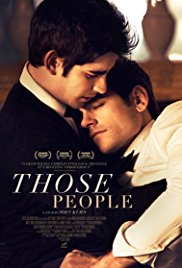
THOSE PEOPLE
US, 2015, 89 minutes, Colour.
Jonathan Gordon, Jason Ralph, Haaz Sleiman, Britt Lower, Megghann Fahey, Chris Conroy, Daniel Gerroll.
Directed by Joey Kuhn.
Those People seems a derogatory title, whether referring to the wealthy New York socialite or to gain men and women.
The film is a focus on gay characters and their relationships, presented with some sensitivity, personalities, relationships, self-discovery, difficulties in being disparaged in society.
The setting is New York, the focus on Charlie (Jonathan Gordon), 26, continuing studies, skill as a painter, enjoying the company of his friends (and a very strong dependence on Gilbert and Sullivan music and lyrics). When he meets a musician in a bar and is attracted, his surprised to discover that he is a professional concert pianist (Haaz Leiman) and they begin an affair. This raises many difficulties in his relationship, generally platonic, with his best friend Sebastian (Jason Ralph).
Most of the film is a kind of close-up on Charlie and his emotions, his relationships, his dilemma is, the choices that he has to make.
1. The New York story? New York society?
2. A story from the New York a society? Characters, way of life, the arts? The musical score? Drawing on Gilbertson Sullivans operators, the Modern Major-General? The Gondoliers, the Mikado, HMS Pinafore?
3. Charlie’s story? His age, 26, studies, wealthy, the devotion of his mother, the early death of his father? Background of school? Friendship with Sebastian? Outing Sebastian at school? His consciousness of his sexual orientation? His paintings, the exhibition, painting Sebastian? His friendship with Sebastian, dependence? Joking recitations of Gilbert and Sullivan? Going to the bar, the encounter with Tim, the attraction?
4. The background to his friends, Sebastian and his father, the financial deals, prison, his visits? The dependence on Charlie but no sexual encounters? Bringing friends home? Charlie upset, the invitation to the threesome, his walking out? The encounter with his father, his father’s suicide? His depression, knowing what his father had done and doing nothing? The reconciliation with Charlie?
5. The other friends, the women, their jobs, struggles? The friend from work, participating in the parties and jokes?
6. Tim, his background, angry with his father, in the club, the discovery of his classical music talent, performance, the invitation to go to San Francisco? The attraction to Charlie, their times together, sexual encounters? The consequences? Tim and his being jealous of Sebastian?
7. The final question, the dinner together, Charlie going to San Francisco with Tim, his mother upset at her not telling him, Charlie and his dilemma with Tim and Sebastian, going to say goodbye?
8. Sympathetic insights into the characters, their lives, issues of sexuality and orientation?
Published in Movie Reviews
Published in
Movie Reviews
Saturday, 09 October 2021 12:59
Final Quarter, The
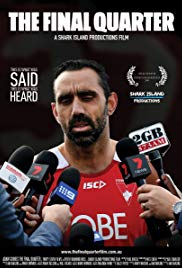
THE FINAL QUARTER
Australia, 2019, 75 minutes, Colour.
Adam Goodes.
Directed by Ian Darling.
In 2019, two films were made about AFL player, Adam Goodes. The Final Quarter was shown at the Sydney Film Festival and on channel 10. The other film, The Australian Dream, was screened at the Melbourne Film Festival and then had a commercial release.
For Australian audiences, both films serve as something of an examination of conscience. Adam Goodes was one of many AFL players with indigenous backgrounds – the time of the making of these films, 71 professional indigenous AFL players.
For overseas audiences, the offence depicted in these films might come to a something of a shock, the continued billing of Adam Goodes during matches, as well as racist verbal attacks, controversies in the media, the psychological pressure on goods and his finally retiring from the game. And, at the centre of the controversies, he was named as Australian of the Year, 2014.
This film has many sequences, dates and opponents, of various games from 2014 to 2016. There is plenty of opportunity to see goods and his talent on the field. He is also particularly articulate, in his making speeches, in making message videos. He acquitted himself with dignity as Australian of the Year.
While there were many commentators who are supportive of goods, and he received strong support from his mother who designed jerseys for the indigenous matches, there are quite a number of prominent names, considered Conservative (Andrew Bolt, Miranda Devine, Alan Jones) and it particularly of noxious television commentator, former player, Sam Newman, whose TV rents and accusations are featured in this film.
These years raised questions of how racist Australians were, attitudes towards indigenous people (for many a tolerance when they knew their place), outbursts, the episode of the young girl who called out a monkey epithet to Goodes and he challenged her and she was removed from the grounds, with the conservative commentators criticising him for this – while the film reminds audiences that he spoke very strongly to ask for help for the girl, that was not her fault, that this was the atmosphere in which she had grown up. There were further attacks and, prominent television broadcaster, Eddie McGuire?, made a rash joke about Adam Goodes and King Kong, apologising but finding it hard to live down.
Goodes emerges from this film as a man with dignity, put upon, personally vilified at a time when other indigenous players were not. It is difficult in retrospect to understand why he was so targeted and how this targeting was contagious, month after month, for some years.
A lot of discussion, a lot of commentators, material presented for the assessment of the audience – and the challenge to the AFL and the apologies from leaders that they should have stepped in earlier to prevent the targeting of the building, but which contributes to a continued examination of conscience by all Australians.
Published in Movie Reviews
Published in
Movie Reviews
Saturday, 09 October 2021 12:59
Good Sam
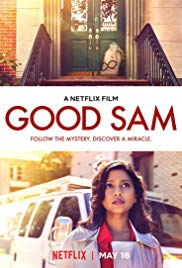
GOOD SAM
US, 2019, 89 minutes, Colour.
Tiya Sirca, Chad Connell, Marco Grazzini, Jesse Camacho, Mark Camacho.
Directed by Kate Melville.
Good Sam is an agreeable light entertainment. Tiya Sirca plays an ambitious reporter, going out to dangerous situations, even needing to be rescued. She is rescued from a fire my genial firefighter, Chad Connell. Obviously, there is a romance in the making.
The title, with reference to the parable of the Good Samaritan, indicates the thrust of the drama, a variety of people receiving financial gifts from an anonymous donor. The reporter’s father is in politics and one of his associates capitalises on the good Samaritan story pretending to be the benefactor.
However, we all know that it is the nice firefighter whose brother has been killed in an accident and that in this boat and who wants to give the benefit to all those who are associated with his brother.
Edifying and enjoyable in a pleasant way.
1. A genial television movie?
2. The American city, the newspaper world, local disasters, fires and brigades? Homes? Political and social worlds? The garage? The musical score?
3. The title, the biblical reference, the Good Samaritan?
4. Katie, ambitious journalist, her father in politics, the meals with him, society gatherings and her being at home? Her relationship with the editor, other members of the staff, rivalries?
5. The initial fire, the dangers, her reporting, getting past security? Erich and the rescue? Connecting with him? The report? The reaction of the editor and warning Katie about dangers?
6. The news of the money donation, the variety of people who were given money, their needs, family, education, illness, donations for research? The anonymity of the donor? The reports, the public response to the articles?
7. Katie and Jack, the social settings, Jack and his furthering his own political cause, his claims to be the good Samaritan, his stolid manner, Katie upset with him, the interviews, is using the same phrases, given to him by the publicity company? Is actually giving a gift? Katie and her suspicions, denunciation?
8. The man with the falls claims, discussions with Katie – yet the good repercussions for the public and their good Samaritan acts?
9. Katie and Eric, the links between them, meals together and cooking, Katie and her detective work, discovering the truth, the boat, directs brother, his death, leaving his boat to Eric, Eric wanting to do good to those associated with his brother, but anonymously and they’re not having any burden?
10. The romance, the continued debt generosity of the citizens? On the park bench, the thanks for Katie depart on to pass on to the Good Samaritan?
11. A genial and pleasant film?
Published in Movie Reviews
Published in
Movie Reviews
Saturday, 09 October 2021 12:59
Bent/ 2018
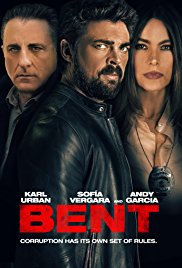
BENT
US, 2018, 96 minutes, Colour.
Karl Urban, Sofia Vergara, Andy Garcia, John Finn, Vincent Spano.
Directed by Robert Maresco.
Bent, as the title indicates, is a thriller about corruption. There is ambiguity in the opening sequences, audiences unsure whether the two policemen on a raid are bent or not. The raid goes wrong, there is an undercover policeman present, there are shootings – and the central character finds himself in prison, denounced by the criminal on the boat of the initial raid.
The film turns into a revenge drama, Karl Urban as Danny, the imprisoned policeman, going to his all-time mentor played by Andy Garcia, who warns him that if he gets what he most desires he will lose himself. Using his skills as a detective, he tracks down the people responsible fairly quickly, comes in contact with a government official, Sofia Vergara, who, of course, turns out to be a femme fatale.
There are some deceptions, Danny achieving his ambitions in some way but his old mentor sacrificing his own life and Danny.
Karl Urban has a screen intensity.
1. The title? Police corruption? Ambiguities? Criminal exploitation
2. Louisiana location photography, the city, waterways, boats, piers? Government offices? The musical score?
3. The focus on Danny, police, the initial raid, the bag of money, the, the discussion about betting? Audience judgement on Danny? The attack on the boat, the bet about the tough man and his cigarette, Charlie and his being forward, discussions, confrontation, shootings, the dead policeman, Driscoll and shooting Charlie? Danny and his drawing his gun, crew shooting?
4. The transition to prison, Danny getting out? Going to see Jimmy, memories of his father and their friendship? Jimmy as X-police, stances, selling bait? Warning Danny about getting revenge, getting what he wanted most and losing himself?
5. Danny and his situation, listening to Katie sing, the relationship, is going on the raid? Severing ties with Katie in prison? Driving past the new job, phoning her, her sadness at his mistrust?
6. The information to Driscoll had given information to the courts, was getting out on April 6, Danny and his calendar, planning revenge?
7. Danny and his checking the various leads, friends, information? Information about Pearce, the product of the film, piers looking out the window, his wife, the car blowing up? Danny and his going to the government offices, his ability to ask innocent questions, pretend to be lost, get guidance? The information about lunch and pierces discussions with him, the government department, finances?
8. The encounter with Rebecca, her working for the Department, her explanations, the issues of the money? Her personality, seductive, sexual encounter? Danny, going to visit Loach, realising that Rebecca was not telling him the truth? The phone call, her going to the pier, the confrontation, the pulling of the guns, her death?
9. Information from the friend, the expert on ballistics, going into the countryside, the confrontation? His giving the information, proving that Rebecca was lying? Getting the gun for Danny and the silencer?
10. Danny and his resolve, his scheme, taking down Rebecca, the issues with Pearce, Loach as innocent?
11. He’s going to visit Jimmy, the truth about Driscoll, Jimmy and his secrets, Driscoll’s hold over him? His regrets? Giving Danny the address? Driscoll, out of jail, Jimmy and his visit, the fish in the discussion about cooking? Jimmy and his stabbing Driscoll, his being stabbed? Danny and the phone call, infiltrating the wrong house, Jimmy saying it was the right house?
12. The irony of the house, Katie’s house, the reconciliation? Jimmy and his self-sacrifice?
Published in Movie Reviews
Published in
Movie Reviews
Saturday, 09 October 2021 12:59
Mean Girls 2
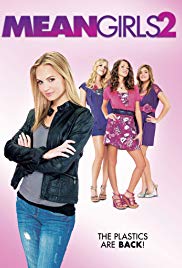
MEAN GIRLS 2
US, 2011, 96 minutes, Colour.
Meaghan Martin, Don Lamkin, Diego Boneta, Maiara Walsh, Lindon Ashby, Claire Holt, Patrick Johnson, Colin Dennard, Jennifer Stone, Tim Meadows.
Directed by Melanie Mayron.
Mean Girls had been a great commercial success in 2004. This is a somewhat belated follow-up, not a sequel, but rather a re-run of the basic plot of the original film.
Meaghan Martin plays Jo, who works with her mechanic father, has ambitions to be an architect and study at the University where her late mother studied. Coming new to the school, she finds the mean Mandi, Maiara Walsh. And, the screenplay certainly makes them snobbish mean girls. One of their targets is Abby, Jennifer Stone, an awkward girl from a wealthy family. Jo takes her side.
The film has a collection of very mean-minded actions, some very nasty, by The Plastics. Jo’s reaction lead to Abby’s father paying her to be Abby’s friend, something she doesn’t want to do but does accept. There are also some boys in the action, especially Diego Boneta as Jo’s partner in studies and her boyfriend. There is quite an assortment of followers in the school, many dominated by The Plastics, and many willing to take sides with Jo.
As, with the first film, Jo becomes so absorbed in her defence of Abby, in defence of herself, that she almost becomes the equivalent of the leader of The Plastics.
The appeal, obviously, is to the teenage audience, especially girls who can identify with Jo and her campaign. They will also enjoy the romantic elements.
The leader of The Plastics becomes more nasty and vengeful but is finally exposed and humiliated – with Jo finishing up as an ideal model and leader. And Abby and her rather no dish computer expert boyfriend becoming the Homecoming king and queen.
The film was directed by actress turned director, Melanie Mayron, who worked extensively for television.
Published in Movie Reviews
Published in
Movie Reviews